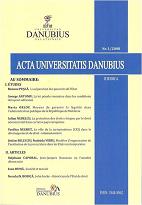MODÈLES D’ORGANISATION DE L’INSTITUTION DE LA PROCURATURE DANS LES ÉTATS CONTEMPORAINS
MODELS OF ORGANIZATION OF THE PROSECUTING INSTITUTION IN THE CONTEMPORARY STATES
Author(s): Nadejda Vieru, Ştefan BelecciuSubject(s): Law, Constitution, Jurisprudence
Published by: Editura Universitară Danubius
Keywords: prosecutor duties; the Public Ministry; judiciary power; magistracy
Summary/Abstract: The term “prosecuting” comes from the Latin word “procurare”, that is “the one who takes care”. According to the Romanian Explanatory Dictionary (DEX) “prosecutor” is an organ of state that supervises the compliance and the application of the laws, sending criminals to justice, supporting the prosecution before the courts and representing the interests of the state in court. The notion of “prosecutor”, in the current terminology is less used. The great French historian and philosopher, Rene David, mentions that the prosecuting institution is more a characteristic of the system of the Roman or continental law. In general the prosecuting institution has evolved, but more often they use the term Public Minister, State Service, Charge Representative or the Attorney Service.
Journal: Acta Universitatis Danubius. Juridica
- Issue Year: 4/2008
- Issue No: 1
- Page Range: 89-97
- Page Count: 9
- Language: French

